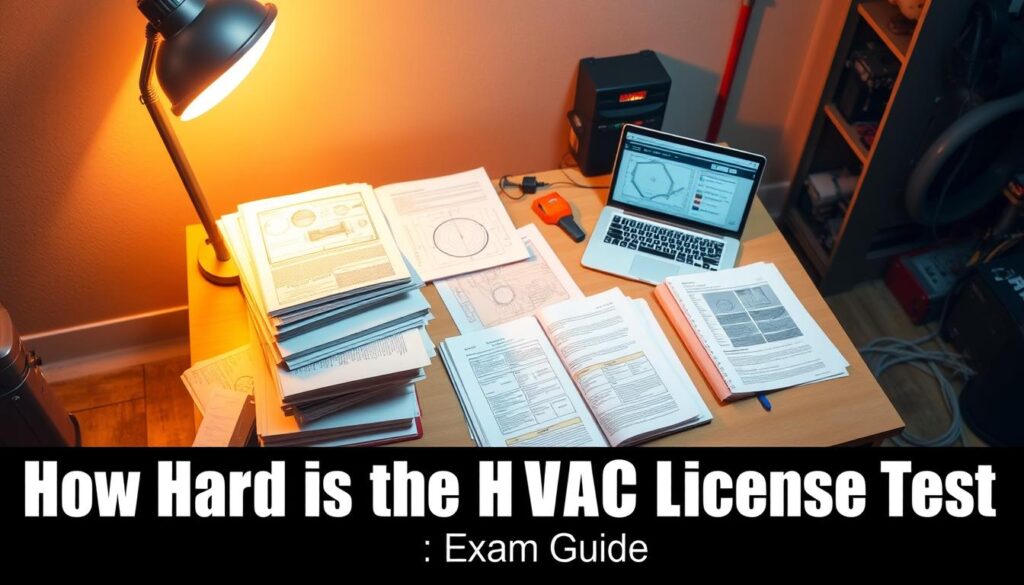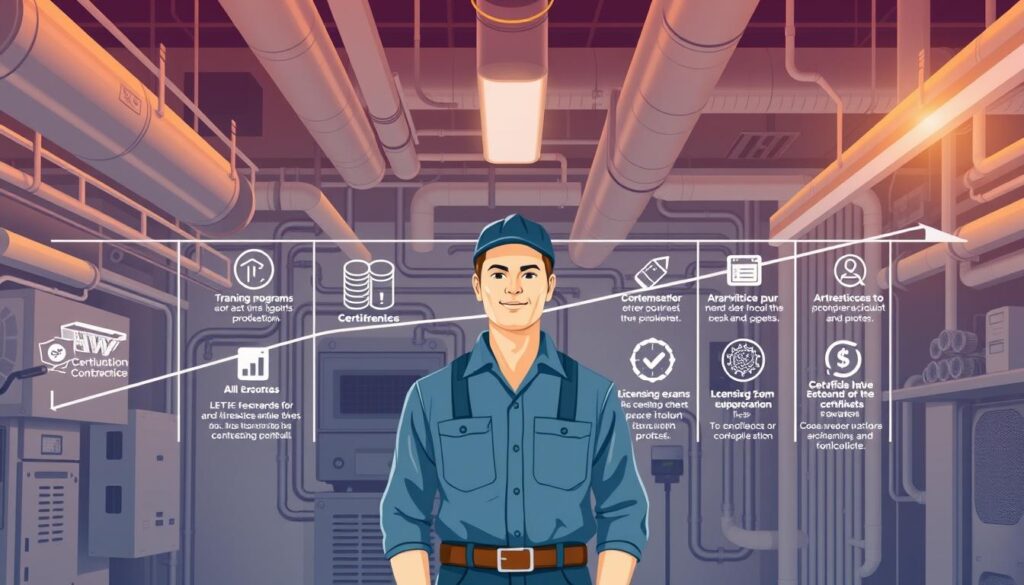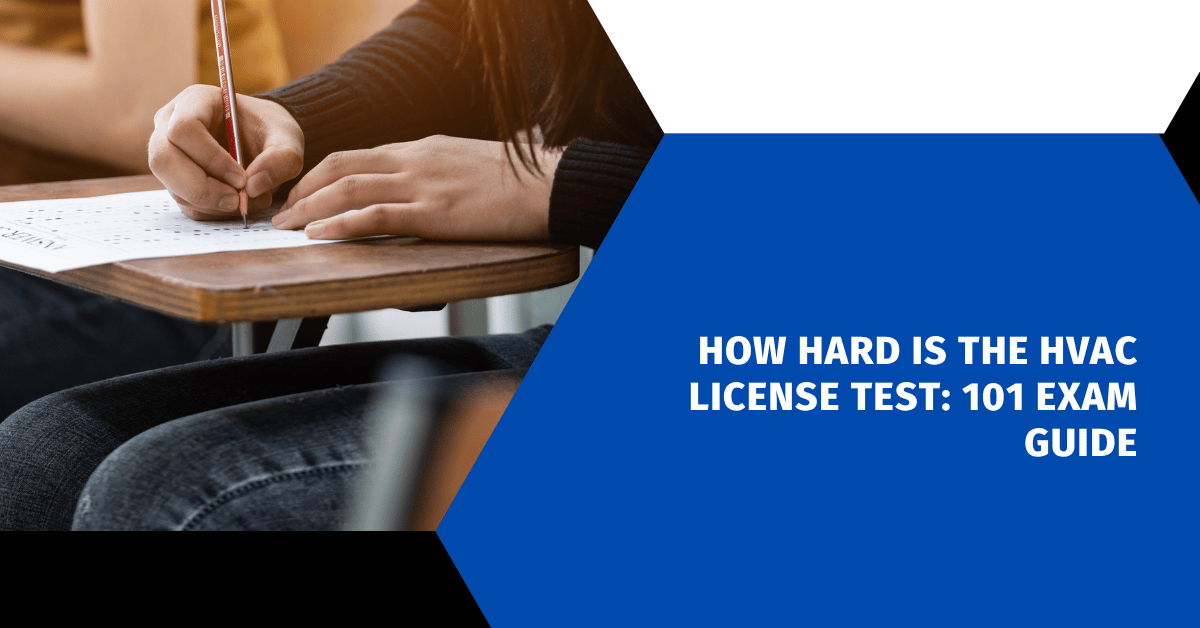Affiliate Disclosure
HVAC Guide Guys is a participant in the Amazon Services LLC Associates Program, an affiliate advertising program designed to provide a means for sites to earn advertising fees by advertising and linking to Amazon.
How Hard Is the HVAC License Test? Are you ready to unlock the secrets of the HVAC certification exam? This exam challenges thousands of aspiring technicians every year. To pass, you need more than just technical knowledge. You also need strategic preparation and insider understanding.

The HVAC certification exam is a big step for professionals in heating, ventilation, and air conditioning. It has 120 tough questions and a 7-hour time limit. This test checks your technical skills in many important areas of the HVAC industry.
Success in the exam depends on knowing its structure and preparing well. You also need to approach the test with confidence. This guide will help you understand the licensing process and give you key insights to pass the test.
Key Takeaways
- The HVAC license test covers 120 questions.
- Exam duration is 7 hours, requiring sustained concentration.
- Open book format provides some flexibility during testing.
- Passing score is 70%, demanding thorough preparation.
- Experience requirements vary by license class.
- Strategic study and practice are key for success.
Table of Contents
Understanding HVAC License Test Requirements and Structure
Getting an HVAC license can be tough. The process tests your technical skills and professional knowledge. Knowing the exam structure is key to a successful HVAC career.
Open Book Format and Passing Criteria
The HVAC test has an open book format. This means you can use approved materials during the exam. Important details include:
- Passing score requirement: 70%
- Open book examination style
- Comprehensive assessment of technical skills
Exam Time Management and Question Diversity
Success depends on managing your time well and knowing the question types. The exam usually has:
- Multiple-choice questions
- Technical calculation problems
- System design scenarios
Most exams last 3-4 hours. You need to manage your time and prepare well.
Test Location Considerations
HVAC exams are held at approved testing centers. These include:
| Testing Provider | Location Type |
|---|---|
| Pearson VUE | Certified Testing Centers |
| DSPS (Department of Safety and Professional Services) | State-Approved Facilities |
“Preparation is the key to conquering the HVAC license test and launching a successful career in climate control technology.”
Remember, HVAC licensing rules vary by state. Always check local laws and prepare for them.
Explore Our HVAC Shop
Looking for top-rated HVAC tools, parts, and accessories? Visit our shop and find the perfect solution for your needs.
Visit the ShopAllowed Reference Materials and Study Resources
When getting ready for the HVAC exam, knowing what materials you can use is key. The HVAC license test lets you use certain resources. These can really help you do well on the exam.
Focus on mastering these important reference materials for your exam prep:
- International Mechanical Code (IMC)
- ASHRAE Standard Handbooks
- SMACNA Technical Manuals
- National Electrical Code (NEC)
- Local and State Building Codes
“Knowing these reference materials can be the difference between passing and failing the HVAC license exam.”
Invest in these critical resources when studying for the HVAC exam. Some must-have study materials include:
- Official exam prep guides
- Online practice tests
- Professional training workshops
- State-specific licensing exam study guides
| Resource Type | Recommended Action | Estimated Cost |
|---|---|---|
| Code Books | Purchase latest edition | $100-$250 |
| Online Practice Exams | Complete multiple mock tests | $50-$150 |
| Professional Workshops | Attend thorough review sessions | $200-$500 |
Pro tip: Get to know these materials well before the exam. This will help you prepare and feel more confident.
Explore Our HVAC Shop
Looking for top-rated HVAC tools, parts, and accessories? Visit our shop and find the perfect solution for your needs.
Visit the ShopCore Technical Knowledge Areas on the Exam
To pass the HVAC license exam, you must show you know a lot about several key areas. The hvac licensing process is all about understanding complex systems and principles. These are the basics of heating, ventilation, and air conditioning.
Being good at technical stuff is key to doing well. The exam checks if you really get the specialized areas of HVAC systems.
Thermodynamics and Heat Transfer Principles
Knowing how heat moves is basic to HVAC. You’ll need to get:
- Conduction principles
- Radiation heat transfer
- Convection dynamics
- Temperature and pressure relationships
Refrigeration Cycle Components
Knowing about refrigeration cycles is a must for the exam. Key points include:
- Compressor functions
- Evaporator and condenser operations
- Expansion valve mechanics
- Refrigerant flow characteristics
| Component | Primary Function | Key Exam Focus |
|---|---|---|
| Compressor | Pressure and temperature manipulation | Refrigerant compression process |
| Condenser | Heat rejection | Thermal transfer mechanisms |
| Expansion Valve | Refrigerant pressure reduction | Metering and flow control |
HVAC System Controls and Operations
The exam will check your knowledge of system controls. This includes:
- Electrical control circuits
- Thermostat programming
- Safety control mechanisms
- Diagnostic troubleshooting techniques
“Mastering these technical areas is your pathway to professional HVAC certification.” – HVAC Training Experts
By focusing on these key areas, you’ll be ready for the tough parts of the HVAC license exam.
How Hard Is the HVAC License Test: Real Experience Analysis
Getting ready for the HVAC license test is like solving a puzzle. It’s a big step for those wanting to work in HVAC. You need to study hard and smart to pass.

People who passed the test share important tips. They say the test checks if you really know your stuff about HVAC systems and codes.
“Success in the HVAC license test comes from consistent preparation and deep understanding of technical principles.”
- The exam covers 100 questions with a challenging 4-hour time limit
- Minimum passing score is 75%, requiring thorough knowledge
- Test difficulty varies based on individual technical background
To understand the test’s level, you need a good plan. Many suggest focusing on key areas like refrigeration, system controls, and following codes.
| Exam Aspect | Key Details |
|---|---|
| Total Questions | 100 |
| Time Limit | 4 hours |
| Passing Score | 75% |
| Preparation Recommendation | 3-month intensive study program |
Success is all about being well-prepared. Use practice tests, study guides, and technical books. This will help you feel ready and confident for the HVAC license test.
Explore Our HVAC Shop
Looking for top-rated HVAC tools, parts, and accessories? Visit our shop and find the perfect solution for your needs.
Visit the ShopEssential Code Books and Technical Manuals
Getting ready for your hvac certification exam means you need to know a lot about important technical guides. Choosing the right code books and manuals is key to getting ready for your hvac license.
Learning these essential resources is vital. It helps you deal with the tough parts of the HVAC licensing exam:
International Mechanical Code (IMC)
The IMC is a detailed guide for HVAC pros. It covers:
- Detailed mechanical system rules
- Installation standards and safety rules
- Ventilation and equipment needs
ASHRAE Standards and Guidelines
American Society of Heating, Refrigerating and Air-Conditioning Engineers (ASHRAE) sets important industry standards. You should focus on:
- System design basics
- Energy saving standards
- Thermal comfort tips
State-Specific Code Requirements
Your area might have special HVAC rules. Make sure to study:
- Local building codes
- Regional environmental rules
- Specific licensing needs
“Knowing these technical guides is key to passing your HVAC certification exam and becoming a pro technician.” – HVAC Industry Expert
Spending time on these important resources will help you feel more confident. It will also up your chances of doing well on the exam.
Test Day Preparation Strategies
Getting ready for your HVAC license test needs careful planning. It’s not just about studying. It’s also about setting up the right mental and physical space for success.
- Organize your reference materials well
- Get your mind ready
- Plan your logistics carefully
- Practice managing your time
“Success in the HVAC license test is 50% preparation and 50% confidence” – Professional HVAC Certification Expert
Here are some important tips for your HVAC exam:
- Only bring allowed reference materials
- Use three-hole punched binders for organized notes
- Avoid loose papers or sticky notes
- Make sure your reference books are properly tabbed
Sleep and nutrition are key for your test day. Try to sleep 7-8 hours the night before. Eat a healthy breakfast. Also, arrive at the test center at least 30 minutes early to handle any surprises.
| Preparation Area | Key Strategies |
|---|---|
| Mental Preparation | Practice relaxation techniques, review key concepts |
| Physical Preparation | Get adequate sleep, eat nutritious meal |
| Materials | Organized binder, permitted reference books |
Using these hvac license test tips can greatly boost your success chances. Remember, preparing for your HVAC exam is a detailed process. It needs strategic planning and focused effort.
Common Challenging Topics and Solutions
Getting ready for your hvac certification exam can feel overwhelming. Many find certain technical areas hard to grasp. This part looks at the toughest topics you’ll face on the hvac license exam.
Pressure and Temperature Relationships
It’s key to understand how pressure and temperature work together. Important points include:
- Atmospheric pressure at sea level is 14.7 psi absolute
- Pressure drops 1 psi for every 2,343 feet up
- Discharge pressure is the high side of refrigeration units
“Mastering pressure-temperature relationships is fundamental to HVAC system design and troubleshooting.”
Load Calculations
Load calculations need to be precise and methodical. You’ll learn about:
- Sensible heat calculations
- Latent heat measurements in BTU
- How heat is absorbed and released
For example, raising 1 pound of ice by 1 degree Fahrenheit below 32 degrees takes 0.5 BTU.
Code Compliance Questions
Code compliance is a big part of the hvac certification exam. Updates like the SEER rating changes in Texas (minimum SEER rating changed from 14 to 15 in 2023) show how important it is to keep up with standards.
Regular practice of these tough topics will help you feel more ready and confident for your hvac license exam.
Explore Our HVAC Shop
Looking for top-rated HVAC tools, parts, and accessories? Visit our shop and find the perfect solution for your needs.
Visit the ShopLicense Levels and Career Advancement

Understanding the HVAC trade certification landscape is key to career growth. The hvac licensing process offers many chances for professional development and higher earnings.
HVAC professionals move through several important licensing stages:
- Apprentice Level: Entry-point certification requiring supervised work experience
- Journeyman License: Mid-level certification with expanded job responsibilities
- Master HVAC Technician: Advanced certification allowing complex project management
Getting higher-level licenses is linked to career advancement. For example, licensed general contractors in the U.S. make an average of $97,202 a year. The cost to get licensed is relatively low, with prices ranging from:
- Apprenticeship License: $100-$200
- Journeyman License: $300-$500
- Contractor License: $700-$1,000
“Continuing education is the key to maintaining and advancing your HVAC professional status.”
To move up, you must meet certain experience requirements. Most contractor licenses need at least five years of work experience. Also, getting specialized certifications like EPA Section 608 can open up new job opportunities.
For HVAC career growth, focus on continuous learning, getting advanced certifications, and keeping up with new technologies.
Conclusion
Starting your HVAC journey is exciting, but it’s just the first step. The path to becoming a licensed HVAC technician is tough. You need four years of work experience and to pass a tough exam.
Getting your HVAC license is more than just a test. It costs around $530 and takes four to five years to prepare. But, it’s worth it. HVAC pros can make between $30,610 and $80,820 a year, based on their skills.
The road to becoming a licensed HVAC technician is tough, but it’s worth it. You’ll learn a lot about HVAC systems and get hands-on experience. This will turn you into a skilled professional ready for any HVAC challenge.
Success in HVAC depends on never stopping learning and applying what you know. Every exam, certification, and work experience helps build your skills. Stay focused, and getting your HVAC license will be a big achievement in your technical career.

